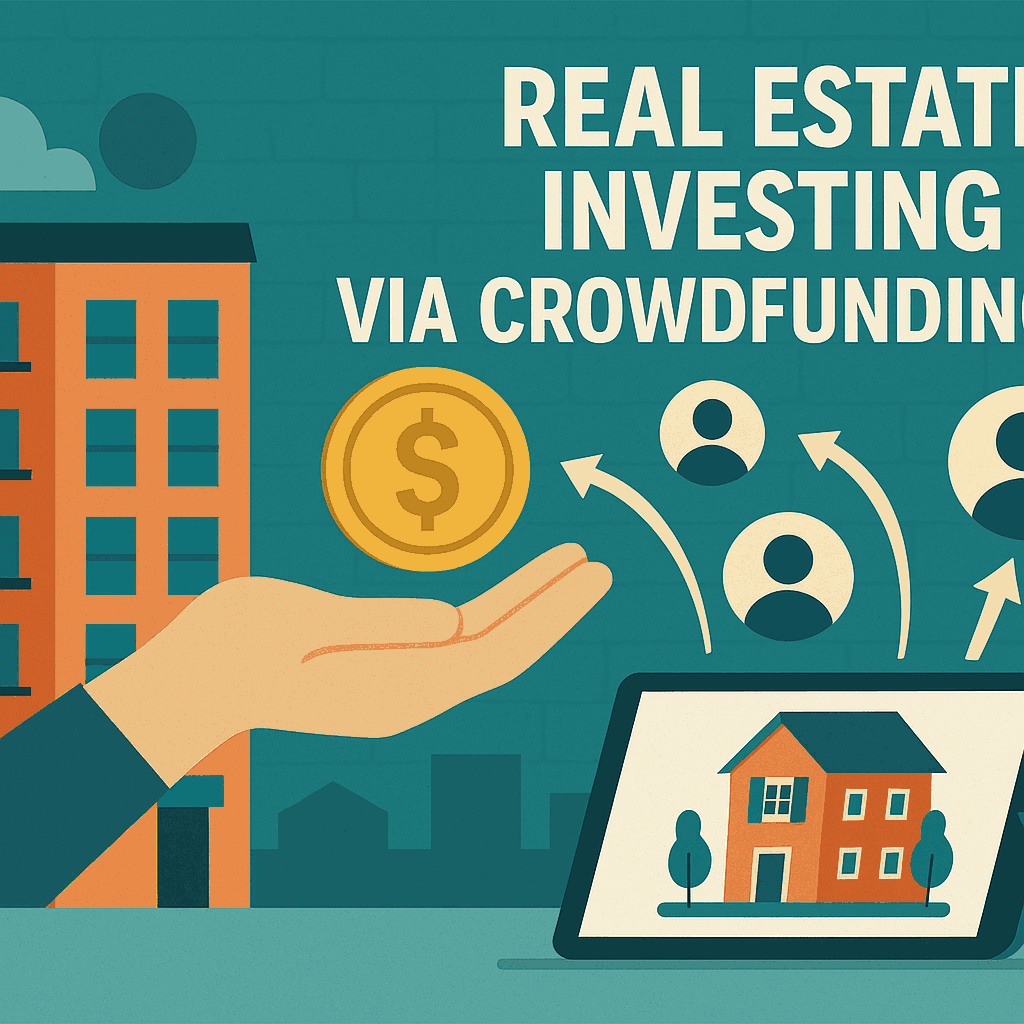
Real estate is one of the most trusted paths to long-term wealth—but not everyone has the capital to buy property outright. Enter real estate investing via crowdfunding, an accessible solution that lets you invest in commercial or residential properties without being a landlord or taking on a mortgage.
Crowdfunding platforms pool money from hundreds or thousands of investors to fund real estate projects, allowing individuals to earn passive income from property markets they might otherwise never access.
Here’s how it works, why it’s booming in 2025, and how you can get started with just a few dollars.
What Is Real Estate Crowdfunding?
Real estate crowdfunding is a method of raising capital for property investment by sourcing funds from a group of individuals online. Instead of needing $100,000 to buy a rental home, you can invest $10, $100, or $1,000 in a share of a project.
These investments can involve:
- Residential rental properties
- Commercial office buildings
- Industrial developments
- Hotels, multi-family units, or REIT portfolios
The platform manages the property, and you receive returns through:
- Rental income distributions
- Interest payments (for debt-based projects)
- Property appreciation over time
Benefits of Crowdfunding Real Estate
Low Entry Barriers
Most platforms let you start investing with as little as $10 to $500, opening the market to younger or budget-conscious investors.
Passive Income
There’s no need to screen tenants, fix toilets, or manage properties. The platform handles everything.
Diversification
You can spread your money across multiple properties in different states or asset classes.
Access to Premium Deals
Crowdfunding platforms often fund institutional-grade properties, such as multi-million-dollar apartments or commercial buildings.
Geographic Flexibility
Perfect for remote investors and digital nomads—you can manage your portfolio from anywhere.
Types of Real Estate Crowdfunding Models
There are two major structures to understand:
1. Equity-Based Crowdfunding
In this model, you become a shareholder in the property. You benefit from rental income and any appreciation upon sale.
Returns may include:
- Quarterly or monthly dividends
- Share of capital gains
- Tax advantages through depreciation
This is ideal for long-term investors seeking higher upside.
2. Debt-Based Crowdfunding
Here, you’re lending money to the property owner or developer. You receive fixed interest payments (like a bond).
Benefits:
- Lower risk
- More predictable returns
- Shorter investment durations (12–36 months)
Best for conservative investors focused on income over appreciation.
Best Real Estate Crowdfunding Platforms in 2025
| Platform | Minimum Investment | Notable Features |
|---|---|---|
| Fundrise | $10 | Great for beginners, user-friendly dashboard, REIT-style |
| RealtyMogul | $5,000 | Accredited and non-accredited options, commercial-focused |
| CrowdStreet | $25,000 | Accredited investors only, premium projects |
| Groundfloor | $10 | Short-term debt investments, 6–12 month duration |
| Arrived Homes | $100 | Buy shares of rental properties, collect monthly rent |
Before signing up, check if you’re an accredited investor (some platforms require it) and whether the platform offers liquidity or resale options.
Risks to Be Aware Of
Lack of Liquidity
Unlike stocks, you can’t sell these investments quickly. Expect to tie up funds for several years.
Platform Risk
Your returns depend on the platform’s ability to select and manage profitable properties.
Market Risk
Real estate values can drop, especially during economic downturns or regional slumps.
Fees
Most platforms charge asset management or servicing fees (often 1–2% annually). These can eat into returns if you’re not careful.
Regulatory Gaps
Not all platforms are equally transparent or SEC-registered. Always research their track record.
How to Start Investing Step-by-Step
- Decide Your Investment Goal
Are you seeking monthly cash flow, long-term appreciation, or capital preservation? - Choose the Right Platform
Use trusted providers with strong reviews and audited performance reports. - Verify Eligibility
Some platforms are only open to U.S. residents or accredited investors. Others are fully open. - Create an Account
Provide ID and tax info (like W-9 for U.S. citizens). Most platforms verify identity within minutes. - Review Investment Deals
Look at the expected returns, risk profile, fees, and hold duration. Read the offering circular and FAQs. - Fund Your Account
You can usually link a bank account and transfer funds via ACH. Some support credit/debit deposits. - Track Your Portfolio
Use mobile apps or dashboards to monitor dividends, project updates, and overall performance.
Who Should Consider Crowdfunded Real Estate?
This method is ideal for:
- Digital nomads who want real estate exposure without ownership
- First-time investors looking to diversify
- Retirees seeking passive income streams
- Entrepreneurs with inconsistent income
- People without the capital to buy physical property
You might want to avoid it if:
- You need access to your cash quickly
- You want to directly manage real estate
- You’re risk-averse and unfamiliar with real estate cycles
Tax Considerations
You’ll typically receive a Form 1099-DIV or 1099-INT for your income. Depending on your structure, your returns may qualify for lower long-term capital gains or be taxed as ordinary income.
Also note:
- Some platforms offer IRAs for tax-deferred growth
- Real estate losses may offset other income (especially in equity-based REITs)
Final Thoughts
Real estate investing via crowdfunding opens the door to property wealth without mortgages, tenants, or six-figure down payments. It’s a smart way to diversify your portfolio and generate passive income—especially for mobile professionals and budget-conscious investors.
Start small, choose well-rated platforms, and always read the terms. With the right approach, you can grow a meaningful real estate portfolio one digital dollar at a time.